Global Fund Updates on COVID-19
Meaningful Community Engagement in the COVID-19 Response Mechanism (C19RM)
URGENT: The C19RM process at country level is currently underway
JOIN NOW! BE INVOLVED! BE HEARD!
Prepared by the International Council of AIDS Service Organizations (ICASO) in partnership with GATE, APCASO/APCRG, and LAC Regional Platform
In April 2020, the Global Fund established the COVID-19 Response Mechanism (C19RM) to support countries to respond to COVID-19 in mitigating its impact on HIV, TB, and malaria programs and strengthening health and community systems. On 7 April 2021, the Global Fund launched the second phase of C19RM. All countries receiving funding from the Global Fund are eligible to receive C19RM funding, including multi-country and non-eligible countries in crisis.
Effective and meaningful community and civil society engagement are crucial for developing a robust response to the pandemic. The COVID-19 Response Mechanism Guidelines specifically calls for consultations with “civil society, key and vulnerable populations as well as communities, including those most severely affected by COVID-19”, including those countries experiencing significant disruption.
| Eligible Investments for C19RM |
| 1. COVID-19 control and containment interventions, including personal protective equipment (“PPE”), diagnostics, treatment, communications and other public measures as specified in WHO guidance |
| 2. COVID-19-related risk mitigation measures for programs to fight HIV/AIDS, tuberculosis and malaria, including, but not limited to, support for COVID-19 interventions needed to safely implement campaigns, community and health facility-level HIV, tuberculosis and malaria programs and additional delivery and procurement costs for HIV, TB and malaria programs related to addressing COVID-19 disruptions |
| 3. Expanded reinforcement of key aspects of health systems, such as laboratory networks, supply chains and community-led response systems to address advocacy, services, accountability and human-rights based approaches |
| Applicants can request funding under a combination of the above categories. |
The COVID-19 pandemic has drastically altered engagement, preventing most in-person discussions and data collection while also presenting opportunities to expand engagement using new virtual technologies. The LAC Regional Platform conducted a Situation analysis of the response to HIV, TB and Malaria in the context of the COVID-19 epidemic in countries financed by the Global Fund in Latin America, which describes the participation of Key Populations (KP) and communities in the decisions made by Community Coordinating Mechanisms (CCMs) and the Global Fund, and identifies lessons learned and good practices during the implementation of the first round of C19RM. A similar Rapid Assessment Report on the Emerging Issues of HIV, TB, and malaria-affected communities and civil society in Asia-Pacific by APCASO conducted in 2020 also shows that countries like Nepal conducted their community consultations and Funding Request processes virtually.
The meaningful engagement of civil society, in all its diversity, in the national consultations to develop the country proposal for the C19RM is critical. Civil society can provide valuable data, especially for key populations and harder to reach groups, as well as ensuring that all relevant partners are engaged and play essential roles in design, implementation and reporting stages. The proposal must include inputs from the full spectrum of civil society and communities—including NGOs, networks of people living with HIV, people most severely impacted by COVID-19, and key populations, in particular: men who have sex with men (MSM); transgender people, especially transgender women; sex workers; people who inject drugs; people living with HIV; and people in prison and detention.
For this reason, it is crucial to pay particular attention to the inclusion of members of key populations in the process of developing the proposal. In many countries, members of key populations are structurally sidelined. Criminalization has a knock-on effect that prevents registration of organizations run by and for members of key populations. It is crucial to create a safe environment to ensure the meaningful involvement of key populations and people who might otherwise be prosecuted for criminal offences relating to their identity, occupation or behavior.
SUBMISSION WINDOWS
There are four windows to apply to the C19RM. It is important that the submission window selected ensures community input to strengthen the funding request.
| Submission Window | Date |
| Window 1 | 14 May 2021 |
| Window 2 | 31 May 2021 |
| Window 3 | 15 June 2021 |
| Window 4 | 30 June 2021 |
| Window 5 | 16 July 2021 |
| Window 6 | 17 September 2021 |
List of countries by submission window as of 21 July 2021
| Country | C19RM Base Allocation (USD) | Fast-track submission date | Full Grant Submission Window |
| Afghanistan | 8,778,411.00 | – | Awarded 02 July 2021 |
| Bangladesh | 23,830,690.00 | Awarded 07 July 2021 | Window 4 |
| Bhutan | 530,223.00 | Awarded 01 June 2021 | Window 4 |
| Cambodia | 14,335,541.00 | Awarded 12 May 2021 | Awarded 25 June 2021 |
| India | 75,000,000.00 | Awarded 04 May 2021 | Window 4 |
| Indonesia | 44,011,161.00 | Awarded 17 June 2021 | Window 3 |
| Iran | 1,683,312.00 | – | Window 4 |
| Lao PDR | 4,162,247.00 | Window 4 | |
| Malaysia | 594,641.00 | – | – |
| Mongolia | 2,001,650.00 | – | Awarded 18 June 2021 |
| Multicountry HIV SEA AFAO | 1,875,000.00 | – | – |
| Multicountry TB Asia UNDP | 600,000.00 | – | – |
| Multicountry TB UNOPS | 1,125,000.00 | – | Window 3 |
| Multicountry Western Pacific | 1,988,226.00 | – | Window 5 |
| Myanmar | 45,848,163.00 | – | Window 5 |
| Nepal | 7,745,867.00 | Awarded 12 May 2021 | Window 3 |
| Pakistan | 41,714,039.00 | 31 May 2021 | Window 4 |
| Papua New Guinea | 11,698,330.00 | Awarded 04 June 2021 | Window 4 |
| Philippines | 22,114,790.00 | Awarded 12 May 2021 | Awarded 22 June 2021 |
| Solomon Islands | 1,383,692.00 | Awarded 17 June 2021 | Window 4 |
| Sri Lanka | 1,414,095.00 | Awarded 01 June 2021 | Window 4 |
| Thailand | 12,393,998.00 | Awarded 01 June 2021 | Awarded 13 July 2021 |
| Timor Leste | 2,362,704.00 | Awarded 04 June 2021 | Awarded 22 June 2021 |
| Viet Nam | 21,892,238.00 | Window 3 |
Source: https://www.theglobalfund.org/en/covid-19/allocations-and-funding-request-tracker/
Deadline to utilize funds is on 31 December 2023.
There is also an opportunity to apply through the ‘Fast-Track’ approach. Applicants can submit an initial C19RM application on an accelerated basis to support urgent needs for COVID-19 health products and costs relating to the effective deployment of such health products, particularly personal protective equipment and COVID-19 diagnostics, including technical assistance. Please note that this is an optional step.
The community sector holds the key to critical data and information that governments may not have, or are unwilling to report on, particularly concerning the needs and challenges faced by key populations and those marginalized and most at risk. Community groups can bring to the table relevant and updated information that will present a more realistic picture of the country’s pandemic status.
Five Steps for Meaningful Community Engagement in the C19RM
These steps will ensure meaningful involvement in the C19RM process by mobilizing the community sector to advocate for ‘More than a seat at the table.’
1. Gather all the relevant documentation:
- Allocation letter for current grant
- C19RM allocation letter, which confirms the potential C19RM amount available to the country, which has been sent to your CCM
- C19RM Funding Request Instructions
- Template C19RM funding request form
- Health Product Segmentation Framework
- National Strategic Preparedness and Response Plan for COVID-19 (“NSPRP”)
*for i and ii, please coordinate with your coordinate with the community and CS representatives in your CCM to find out the key details of these letters *for vi, do get in touch with your CCM Secretariat or CCM representatives for access to these documents
Other relevant documents include, but not limited to the ones listed below. You should check the Global Fund section on the C19RM constantly:
- COVID-19 Guidance Note: Community, Rights and Gender. Community, rights and gender considerations have also been integrated into disease-specific guidance notes
- COVID-19 Guidance Note: Human Rights in the Times of COVID-19
- Guidance note on conducting inclusive country dialogues virtually
- Value for Money Technical Brief to address efficiency and sustainability aspects of COVID-19 investment
- Examples of Community, Rights, and Gender-related Investments during COVID-19: Summary of COVID-19 Guidance Notes and Recommendations from Civil Society and Communities
2. Remember the following key information points.
Country C19RM allocation letters should have already been received by your CCMs. The allocation letters encourage C19RM funding request submission to be done in the earliest windows, which risks funding request processes being rushed and failing to institute meaningful consultations with communities and civil society. We need to push our countries to submit the application in a window when there is confidence that the requirement for robust consultations will be duly met.
If countries need to access funds urgently for commodities, we should push for submission of fast-track requests first and separately from the rest of the Base Allocation request which may be submitted in the later windows.
Community systems and responses are eligible for funding. We should make sure our countries’ C19RM funding requests include the following interventions which are eligible for funding. Also remember that community responses should also be included in the other interventions, even those that are “COVID-19 interventions”, such as contract tracing, testing, work on vaccine hesitancy, etc. :
- Community-led monitoring
- Community-led advocacy and research
- Social mobilization, building community linkages and coordination
- Institutional capacity building, planning and leadership development
- Gender-based violence (GBV) prevention and care
- Respond to human rights and gender-related barriers to services
Ensure that CSS interventions are included in the Base Allocation request and not pushed to the above allocation request.
Support and empower our civil society and community representatives in the CCM with information so that they are able to effectively engage and influence the CCM discussions and decision making on C19RM.
3. Know that your input is essential and critical.
The Global Fund strongly encourages the meaningful involvement of ALL stakeholders, particularly communities and civil society representatives in all its processes at country level, and outlines how communities and civil society can be meaningfully engaged across the 9 of 10 Pillars of national COVID-19 responses.
The Fund Portfolio Managers have sent the C19RM allocation letters and guidance notes to the Chair of the Country Coordinating Mechanism, copying all CCM members. The CCM Secretariat is tasked with coordinating the development of the C19RM funding request, engaging all stakeholders and submitting the C19RM funding request to the Global Fund Secretariat. Civil society representatives in the CCM should reach out to organizations working with and for people living with HIV, men who have sex with men, people who use drugs, sex workers, transgender people, women and young people as well as people in prison, migrants, indigenous populations and other groups based on the specificities of your country, including “non-traditional” CCM communities (people at risk of COVID-19).
If you are not a member of your country CCM, do get in contact with the CCM member that represents your community. If your community is not represented in the CCM, partner with organizations who are members of your CCM. You can find contact information for your CCM here. In places where key populations face criminalization or other legal obstacles, ensure they can input into the process safely.
NOTE: in countries with no CCMs, it is important to coordinate efforts with the group or committee that replaces the functions of a CCM.
4. Do not wait to be asked to participate.
Ask the country focal point how they are facilitating civil society’s input throughout the C19RM process. Also, contact the APCRG Platform to find out if your organization can access technical assistance to improve the quality of civil society involvement. You can also directly contact the civil society representatives in the CCM and arrange a (virtual) meeting, noting that “in addition to CCM’s existing annual funding, a request can be made for an increase of up to 25% of the CCM’s 2021 funding amount to support increased engagement with civil society and communities and to ensure coordination with national response bodies and alignment with national plans.” The funding request preparation process should involve (virtual) consultations with all stakeholders, including validating the final proposal.
If there are engagement bottlenecks, please do not wait until the submission is completed! Report them as soon as possible to your Country Team, CRG Regional Platform or KP networks.
5. Use technology to offer input and share information.
COVID-19 has presented obstacles to in-person meetings. However the use of various communications platforms presents opportunities to engage effectively. The use of these technologies means that geography (and resources) are not obstacles – people can offer input and participate from anywhere. However, civil society partners must clearly understand the roles and responsibilities as well as the opportunities and limitations of this process. Consider using social media and other platforms to share information with your peers and build common priorities and a coherent message. Virtual consultations, such as the Global Fund Virtual Inclusive Dialogue Guidance Note, also offer an opportunity for key populations to participate from the safety of their own environment. Civil society must be involved in all aspects and all stages of the development of the proposal: relevant data gathering and analysis, identification of needs, opportunities and barriers for implementation, agreement on priorities to be funded (it is important to list and include priorities that often get pushed aside: human rights and gender interventions, community-led monitoring, advocacy, etc.), proposal writing, and budget development. After the proposal is reviewed, civil society must be involved in the grant-making process, as explained in Make or Break.
APPLY FOR TECHNICAL ASSISTANCE
You can still apply for a Technical Assistance (TA) Request to support C19RM activities at country level. Examples of TA that you can propose include: (a) convening communities to review C19RM budgets during grant-making negotiations to ensure community priorities remain included, (b) participating strategically in decision-making about C19RM implementation arrangements, including identifying or positioning community SRs/SSRs for specific activities, or (c) refining and validating tools that support communities to monitor C19RM grant implementation
Feel free to reach out to us if you need support in developing your TA Request by clicking the link below and so we can alert the Global Fund Secretariat as soon as possible. You may also download the TA Request form by clicking the button below.
ADDITIONAL RESOURCES
Specific considerations per disease program and around community, rights, and gender are being developed as of this time. Click on any of the available technical guidance below to learn more
We will also keep this section updated as new guidances are released.
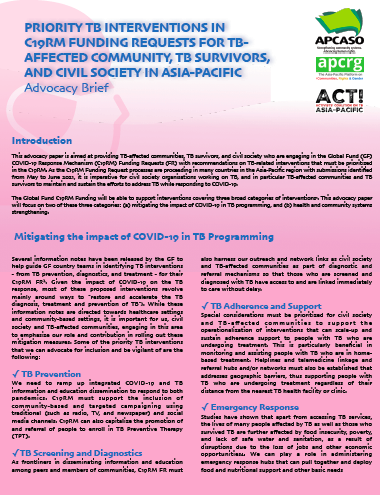 | 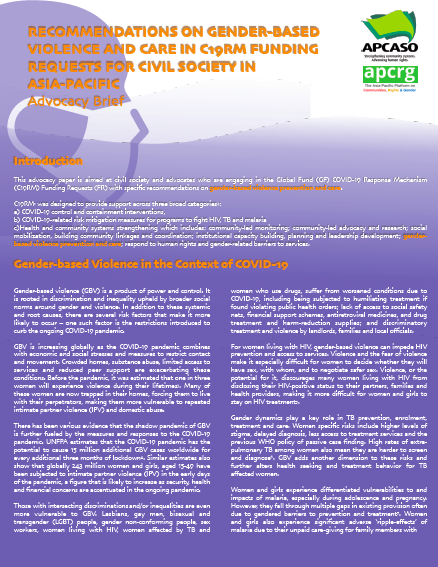 | 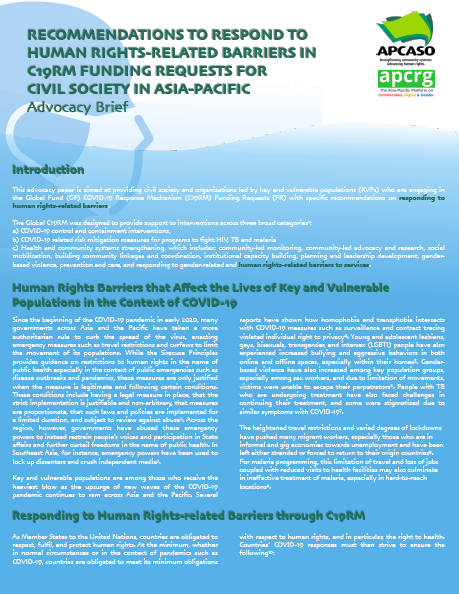 |
- (NEW!) Information Note for CSOs on COVID-19 Testing (APCASO et. al)
- Recommendations to Respond to Human Rights-related Barriers in C19RM Funding Requests for Civil Society in Asia-Pacific
- Recommendations on Gender-based Violence and Care in C19RM Funding Requests for Civil Society in Asia-Pacific
- Priority TB Interventions in C19RM Funding Requests (APCASO et. al)
- Women4GlobalFund (W4GF) C19RM Action Alert (W4GF)
- “Catch-up” Plans to Mitigate the Impact of COVID-19 on Tuberculosis Services (Global Fund)
- Community, Rights, and Gender Guidance Note (Global Fund)
- Considerations for Global Fund HIV support in the context of the COVID-19 pandemic (Global Fund)
- Considerations for Global Fund TB support in the context of the COVID-19 pandemic (Global Fund)
- Considerations for Global Fund malaria support in the context of the COVID-19 pandemic (Global Fund)
- Considerations for Global Fund support for Resilient and Sustainable Systems for Health in the context of the COVID-19 pandemic (Global Fund)
- COVID-19 Guidance Note: Human Rights in the Times of COVID-19 (Global Fund)
- Mitigating the Impact of COVID-19 on Countries Affected by HIV, TB, and malaria (Global Fund)
- Priorities for Global Fund HIV Support (Global Fund)
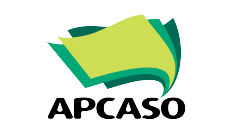
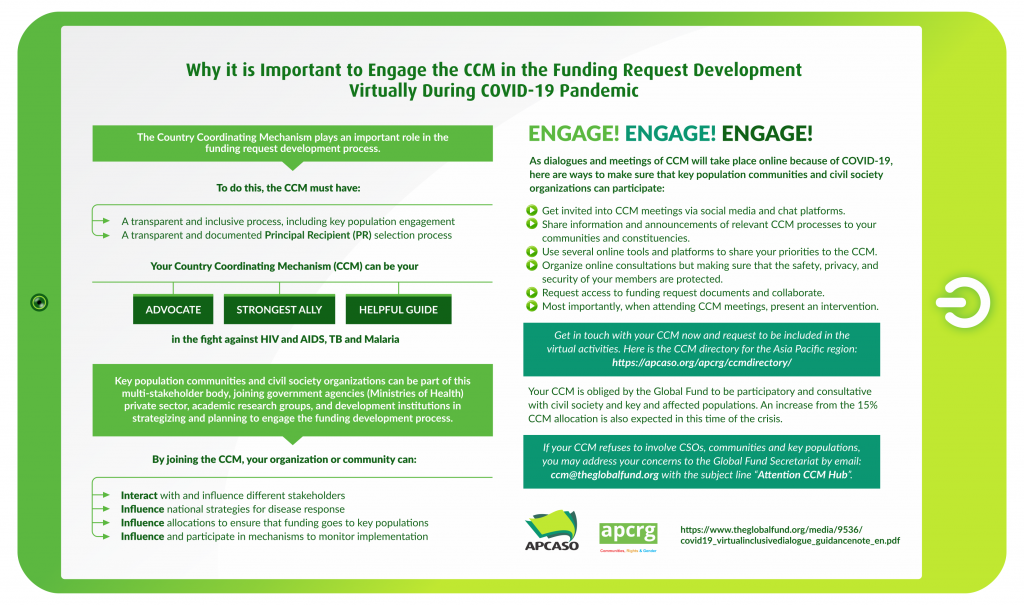
i think you are doing good works
Dear Sir/Madam
we are humbly request please support prisoners for COVID19 prevention and stigma and discrimination program. Lack of resources very difficulty for Nepal prisoners
Thanks
Rishi
We need transparency from Global fund resources eg. Pr management cost, Sr management cost and program cost